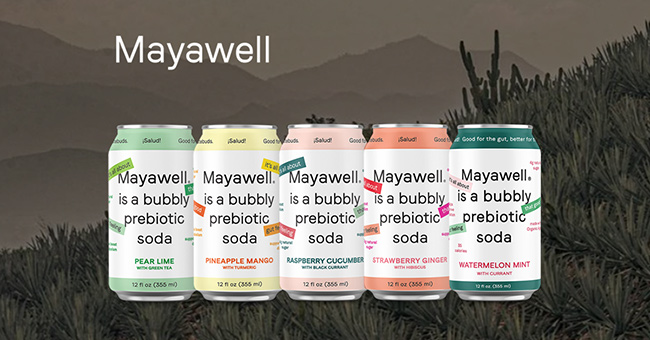After a tough 2022 forced the company to take a “higher-level look” at its business, Mayawell is charting a new way forward.
Over the past twelve months the Austin-based bubbly prebiotic beverage brand introduced a Watermelon Mint flavor, onboarded and then off-board with a new co-packing partner, saw transitions within its internal team, tested the waters with a handful of distributors, and ultimately locked in three new retail accounts, only to have those deals put on ice when each of the buyers left their jobs for new gigs.
“I don’t think anybody on our team has ever seen anything like it,” said co-founder and CEO Oliver Shuttlesworth. He explained that eventually they were able to get a few of those original deals back over the finish line but are still working on one. “Definitely some frustrating things to happen without a doubt, but I think it helped us get clarity through the process.”
Despite a steady stream of challenges on top of the already difficult operating environment with rising labor, manufacturing and transportation costs, Mayawell continued to grow sales year-over-year, said Shuttlesworth.
He pointed to non-performance from outside partners as the root cause; in each of these instances, he explained, his team had skipped over some due diligence processes when choosing those partners in favor of immediate opportunities to “hit the ground running.” Those shortcuts ended up stalling the brand’s growth and severing the customer feedback loop that could have been open if the distribution expansions had come to fruition, Shuttlesworth explained. With plenty of learnings now accrued, he believes the brand is in a “solid spot” to drive growth in the year ahead.
“Dealing with these different issues at a distribution level allowed us the opportunity to step back and [focus on] finding the right people and taking our time in doing that – even if that means the order isn’t coming tomorrow,” said Shuttlesworth. “You can’t always take everyone’s word, which we already knew, but when some people come to you recommended, there’s a certain level of [inherent] trust.”
Shortly after moving its product from glass bottles, into cans, the agave-based, pulque-inspired beverage brand raised $2 million and intended to grow its presence within its home market of Texas, as well as California and Florida. But between then and now, Mayawell faced an uphill battle getting drinks off the production line and on to shelves.
Shuttlesworth said that Mayawell built a solid network of brick and mortar retail accounts throughout Texas. They began looking into distribution partners to help manage and grow in stores, but when the accounts were handed off, “we promptly saw them tank the business that we had built,” Shuttlesworth stated.
That challenge forced the team to reassess and work to diversify the business, meaning leveraging e-commerce, both direct-to-consumer and Amazon. Now, online channels account for about a quarter of the brand’s sales, while its distribution challenges at retail have also spurred a move into on-premise channels like bars and restaurants. On-premise was originally intended to be a key growth driver, but that avenue was never explored in earnest due to pandemic lockdowns following the brand’s launch in 2019.
Throughout its distribution woes, Mayawell’s close knit, internal team saw some change-ups as well with multiple members moving to new opportunities or choosing to step back from their careers and focus on family, Shuttlesworth said. The brand now boasts a team of nine after bringing in two former Olipop employees, Edwin Milstein and Dominic Alvarado, to drive sales on the East and West Coasts, respectively.
This year, the brand is focused on expansion in Northern California and the Pacific Northwest as well as on the East coast, specifically the Northeast and Mid Atlantic regions. Mayawell is currently available at Whole Foods, Central Market, Foxtrot, ShopRite as well as numerous independent and regional retailers.
According to Shuttlesworth, the company’s model from day one has been to grow the brand quickly, but without giving away product and paying for its margins. He said the brand is not currently looking to raise additional funds but noted that the conversation is ongoing with their investment partner, Mexico-based distillery Casa Armando Guillermo Prieto.
Mayawell is realistic about the difficulties of reaching profitability in the beverage industry, particularly as an early-stage startup; however, Shuttlesworth said the team remains focused on investing in partnerships where they aren’t “just lighting money on fire” and instead, methodically growing to build a business with longevity.
“We got advice early on [that] this is a business that people will always tell you they can do ‘X,Y and Z’ for you [but] they’re trying to take your money – we have definitely found that that is true,” Shuttlesworth said. “We try to be transparent as a brand, and as people who didn’t have a beverage background, everything has been a learning experience. Even if you feel like you’re starting to learn the proper do’s and don’ts, sometimes you still make a misstep.”
